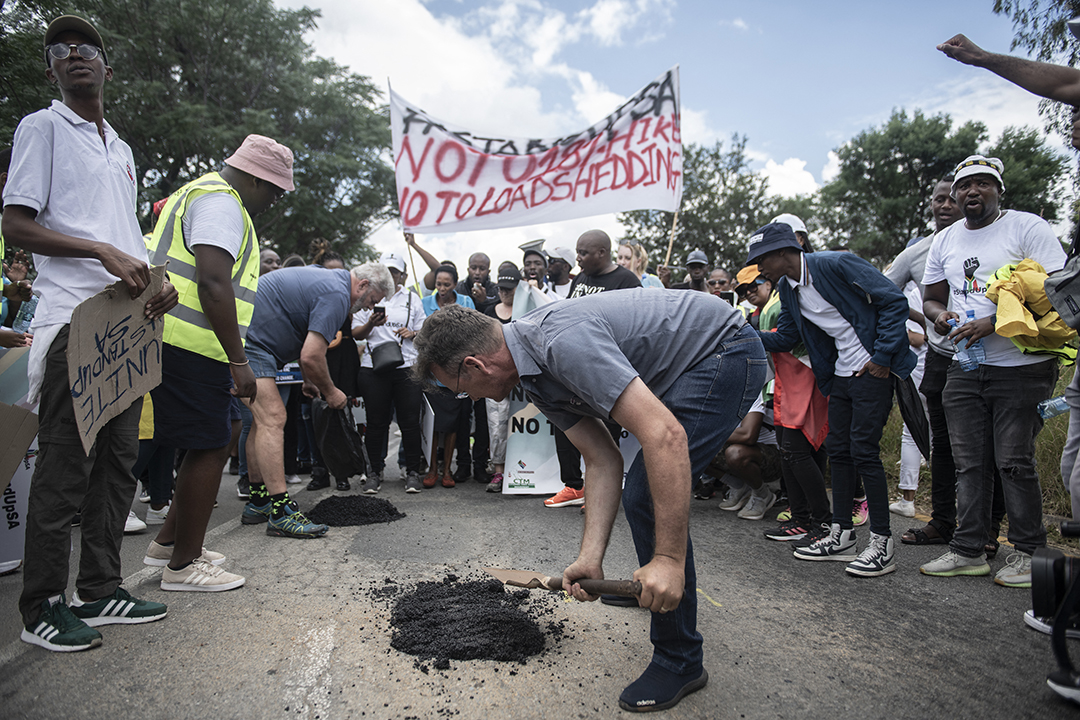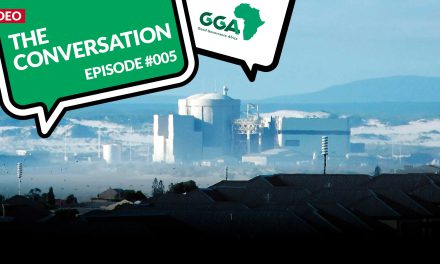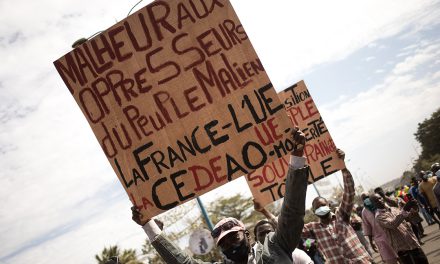Clean audits are a necessary but insufficient condition for achieving governance performance. But there is more to the story than that. It is highly unlikely that audited entities will deliver value for their shareholders in the long run unless their finances are clean and efficient. But those finances also have to be geared towards achieving the entity’s mandate.
Governance can be a rather enigmatic concept. It’s typically defined as the authoritative allocation of resources, but that can sound ethereal. Good governance is about allocating resources efficiently, proactively, transparently and accountably.

Members of the #StandUpSA and #NotInMyName movement fix potholes, symbolising Eskom’s failing maintenance, during a march to Eskom Megawatt Park, the headquarters of the power utility company, in Johannesburg on February 2, 2023. Photo: Maria Giulia Trombini/AFP
Most of us can grasp that, but where we really feel the effect of good or bad governance is at the local government level. When the potholes get fixed within 24 hours, that’s usually an indication of good governance.
Another dimension of governance, then, is responsiveness; well-governed entities respond timeously and proficiently to their shareholders.
In the case of citizens, we are the shareholders of the government and should demand value.
These prefacing remarks should inform our reading of the latest auditor general report on local government audit outcomes for 2022-23, which paints a dismal picture of the state of governance.
Only 34 out of 257 (13%) local municipalities received a clean audit. This is down from 41 in 2020-21.
A clean audit indicates two important things. First, there are no material irregularities (unqualified) contained in the financial statements. Second, these statements are without findings — in other words, they indicate efficiency. Taxpayers’ money has not been spent unnecessarily or on dubious items.
In 2022-23, 110 municipalities received unqualified audits with findings—that there was spending on questionable items even if there were no material irregularities per se in the financial statements. This figure is at least up from 100 in 2020-21, although it would be far preferable if these municipalities could have both clean finances and clean procurement, zero overpayments or spending on dubious items.
And 85 municipalities had material irregularities and questionable spending.
The other 28 are essentially in deep distress, with 10 of those not having provided enough information on which to conduct an audit. Only two municipalities were in that situation the previous year.
So, although the number of municipalities receiving disclaimed audits with findings of poor performance has decreased, it looks as if those which received disclaimed audits in the past are now simply not submitting enough information to be audited at all.
At the metro level, the City of Cape Town was the only one to receive a clean audit. Tshwane improved notably; it now has clean (unqualified) finances but with findings pertaining to the performance of those finances.
But the governance picture is clearly worst at the local level (that is, not secondary cities or district level).
Aside from the high-level results, the other key thing to examine in a report of this nature is the extent of fruitless and wasteful expenditure. In the previous year (2021-22) this figure was an eye-watering R4.89 billion. In 2022-23, this rose to a barely conceivable R7.41 billion (out of a total budget of R572.68 billion).
Gauteng is the worst offender by a long way (R2.34 billion), followed by Mpumalanga (R1.64 billion) and the Free State (R1.41 billion).
To make matters worse, the report says: “This amount could be even higher, as 15 municipalities (including 50% of municipalities with disclaimed audit opinions) did not report all the fruitless and wasteful expenditure they should have reported in their financial statements.”
The “good” news in this dark picture is that metros, at R1.62 billion in 2022-23, account for a very small (but rising) proportion of fruitless and wasteful expenditure. And the Western Cape in total accounted for R0.04 billion (less than 1% but still R40 million), suggesting relatively good general governance.
Good Governance Africa (GGA) is interested in how these audit findings map onto its Governance Performance Index (GPI), which is informed by the auditor general’s reports but is less focused on finances and more on the extent to which municipalities are delivering on their core mandate.
The GGA released the latest edition of the index in March this year. On a scale of one to five, with five being best, municipalities in the Western Cape received an average score of 4.13. Perhaps surprisingly, KwaZulu-Natal came in next at 3.5 and Gauteng at 3.42. Gauteng’s poor performance can clearly be explained by the high levels of wasteful and fruitless spending reported by the auditor general.
The index findings mostly agree with the latest auditor general report, which is helpfully mapped on its website. But the picture is quite varied.
Take the Western Cape, for instance: the Cape Winelands district, along with the Garden route, incorporating six municipalities each, received clean audits.
But the West Coast district had a hit rate of only four clean audits within the six (although at least the other two were unqualified with findings). The Central Karoo area, to the contrary, with only four municipalities, received no clean audits. Overberg, with five local municipalities, received only three clean audits.
In the index, Drakenstein ranked first among 19 secondary cities and Stellenbosch came second (both in the Cape Winelands district). Interestingly, although George received a clean audit in 2022-23, this secondary city came only fifth in the country in its category. It was beaten by uMhlathuze in KwaZulu-Natal and Steve Tshwete in Mpumalanga (third and fourth, respectively).
uMhlathuze received a clean audit, with one material irregularity notification issued.
Steve Tshwete deteriorated in its audit performance, regressing to a qualified audit with findings on compliance with legislation. In all likelihood, then, it will drop out of fourth place in the next iteration of the index in 2026.
In Gauteng, Mogale City came seventh out of the 19 secondary cities countrywide, while Emfuleni came 17th. Mogale received a qualified audit with findings on performance and compliance with legislation. Emfuleni received the same result except that three material irregularity notifications were issued. Again, this largely explains its poor performance in the index.
Now for the good news. The fact that we have a robust auditor general in South Africa is something for which we should be grateful. This is not the same as saying “things are terrible but at least we have X”. The auditor general shines a reliable and credible light on what is going in with our public finances.
Yes, it’s true that the situation is manifestly deteriorating and merely having reports may be cathartic and doesn’t solve the problem. Certainly the transparency in itself is incapable of producing accountability and better performance. But, without this kind of data, it’s hard to know where to start to try to build an ecosystem of accountability.
In this respect, what is clear and correctly identified by the auditor general’s report is this: “At those municipalities that have not managed to move out of the disclaimed space, the lack of transparency, accountability and institutional integrity not only leads to non-delivery of services, but also harms the people these municipalities are intended to serve.”
Overall, the call could not be stronger to build “capable institutions with intergovernmental support” and “a culture of ethics and accountability”.
One important way to do this is to pilot substantive, systematic and sustainable interventions. In many dilapidated municipalities, business organisations and residents are providing their own services and taking government to court for failing to act.
While these efforts are laudable, it is better to empower municipal management teams to build a governance register by which they can ensure basic adherence to the King IV Code of Good Governance. Like the auditor general, King IV is committed to moving entities beyond mere compliance, and ensuring that governance mechanisms produce more robust performance.
Building competence takes time, but it will surely stand as an antidote to the current malaise.
Dr Ross Harvey is a natural resource economist and policy analyst, and he has been dealing with governance issues in various forms across this sector since 2007. He has a PhD in economics from the University of Cape Town, and his thesis research focused on the political economy of oil and institutional development in Angola and Nigeria. While completing his PhD, Ross worked as a senior researcher on extractive industries and wildlife governance at the South African Institute of International Affairs (SAIIA), and in May 2019 became an independent conservation consultant. Ross’s task at GGA is to establish a non-renewable natural resources project (extractive industries) to ensure that the industry becomes genuinely sustainable and contributes to Africa achieving the Sustainable Development Goals (SDGs). Ross was appointed Director of Research and Programmes at GGA in May 2020.












